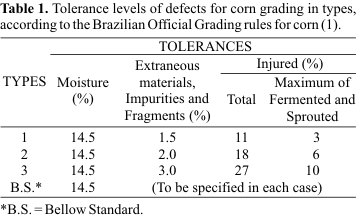The aflatoxin distribution in corn fractions obtained after visual segregation for defects in 30 samples, known to be contaminated, was studied. Each sample was passed through a 5.0 mm round holes sieve, graded for defects and then segregated in sound kernels (regular kernels) and non-sound kernels (injured, germinated, fermented, moldy, heated, insect damaged, immature, broken, hollow, fermented up to ¼, discolored, extraneous materials, and injured by other causes), as defined by the Brazilian Official Grading rules for corn. The non-sound kernels showed the highest contamination levels in all samples. The contamination levels of non-sound kernels (20% of total weight) ranged from 23 to 1,365 µg/kg of aflatoxins (B1, B2, G1 and G2) and were higher than sound kernels (p<1%) ranging from not detected (ND) to 126 µg/kg and in 87% of these the aflatoxin contents were lower than 20 µg/kg. Statistically significant correlation indexes were found among the percentage of defective groups like fermented, heated and sprouted kernels or the total injured kernels, and the estimated contamination levels for the sound and non sound fractions. It was concluded that the non-sound kernels fraction, even being small in weight, has contributed with 84% of the estimated contamination of the samples. The segregation of the non-sound kernels would favor a reduction in the contamination of corn lots. The poorer quality corn types (types 3 and Bellow Standart) have predominated among samples of the experiment.
aflatoxins; corn; contamination distribution; visual segregation; fraction




